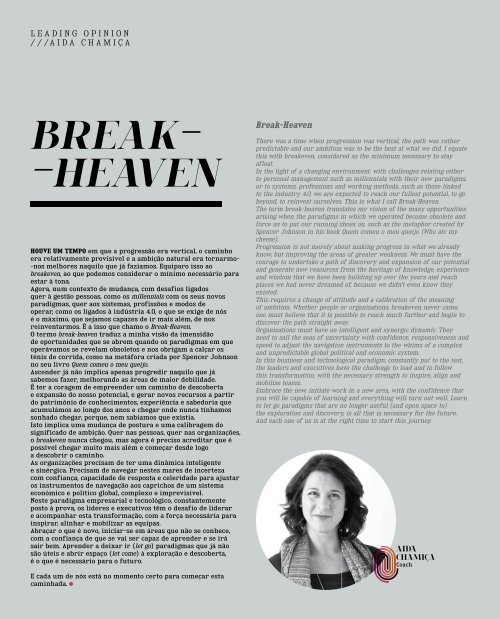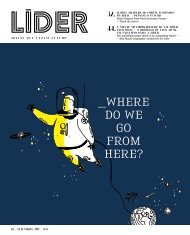Revista Líder – Setembro(2017) Nº1 Pago
Create successful ePaper yourself
Turn your PDF publications into a flip-book with our unique Google optimized e-Paper software.
Leading Opinion<br />
///Aida Chamiça<br />
Closing interview<br />
///pedro almeida e maria joão gouveia<br />
BREAK-<br />
-HEAVEN<br />
Houve um tempo em que a progressão era vertical, o caminho<br />
era relativamente previsível e a ambição natural era tornarmo-<br />
-nos melhores naquilo que já faziamos. Equiparo isso ao<br />
breakeven, ao que podemos considerar o mínimo necessário para<br />
estar à tona.<br />
Agora, num contexto de mudança, com desafios ligados<br />
quer à gestão pessoas, como os millennials com os seus novos<br />
paradigmas, quer aos sistemas, profissões e modos de<br />
operar, como os ligados à indústria 4.0, o que se exige de nós<br />
é o máximo, que sejamos capazes de ir mais além, de nos<br />
reinventarmos. É a isso que chamo o Break-Heaven.<br />
O termo break-heaven traduz a minha visão da imensidão<br />
de oportunidades que se abrem quando os paradigmas em que<br />
operávamos se revelam obsoletos e nos obrigam a calçar os<br />
ténis de corrida, como na metáfora criada por Spencer Johnson<br />
no seu livro Quem comeu o meu queijo.<br />
Ascender já não implica apenas progredir naquilo que já<br />
sabemos fazer, melhorando as áreas de maior debilidade.<br />
É ter a coragem de empreender um caminho de descoberta<br />
e expansão do nosso potencial, e gerar novos recursos a partir<br />
do património de conhecimentos, experiência e sabedoria que<br />
acumulámos ao longo dos anos e chegar onde nunca tínhamos<br />
sonhado chegar, porque, nem sabiamos que existia.<br />
Isto implica uma mudança de postura e uma calibragem do<br />
significado de ambição. Quer nas pessoas, quer nas organizações,<br />
o breakeven nunca chegou, mas agora é preciso acreditar que é<br />
possivel chegar muito mais além e começar desde logo<br />
a descobrir o caminho.<br />
As organizações precisam de ter uma dinâmica inteligente<br />
e sinérgica. Precisam de navegar nestes mares de incerteza<br />
com confiança, capacidade de resposta e celeridade para ajustar<br />
os instrumentos de navegação aos caprichos de um sistema<br />
económico e político global, complexo e imprevisível.<br />
Neste paradigma empresarial e tecnológico, constantemente<br />
posto à prova, os líderes e executivos têm o desafio de liderar<br />
e acompanhar esta transformação, com a força necessária para<br />
inspirar, alinhar e mobilizar as equipas.<br />
Abraçar o que é novo, iniciar-se em áreas que não se conhece,<br />
com a confiança de que se vai ser capaz de aprender e se irá<br />
sair bem. Aprender a deixar ir (let go) paradigmas que já não<br />
são úteis e abrir espaço (let come) à exploração e descoberta,<br />
é o que é necessário para o futuro.<br />
E cada um de nós está no momento certo para começar esta<br />
caminhada.<br />
Break-Heaven<br />
There was a time when progression was vertical, the path was rather<br />
predictable and our ambition was to be the best at what we did. I equate<br />
this with breakeven, considered as the minimum necessary to stay<br />
afloat.<br />
In the light of a changing environment, with challenges relating either<br />
to personal management such as millennials with their new paradigms,<br />
or to systems, professions and working methods, such as those linked<br />
to the industry 4.0, we are expected to reach our fullest potential, to go<br />
beyond, to reinvest ourselves. This is what I call Break-Heaven.<br />
The term break-heaven translates my vision of the many opportunities<br />
arising when the paradigms in which we operated become obsolete and<br />
force us to put our running shoes on, such as the metaphor created by<br />
Spencer Johnson in his book Quem comeu o meu queijo (Who ate my<br />
cheese).<br />
Progression is not merely about making progress in what we already<br />
know, but improving the areas of greater weakness. We must have the<br />
courage to undertake a path of discovery and expansion of our potential<br />
and generate new resources from the heritage of knowledge, experience<br />
and wisdom that we have been building up over the years and reach<br />
places we had never dreamed of, because we didn’t even know they<br />
existed.<br />
This requires a change of attitude and a calibration of the meaning<br />
of ambition. Whether people or organisations, breakeven never came,<br />
one must believe that it is possible to reach much further and begin to<br />
discover the path straight away.<br />
Organisations must have an intelligent and synergic dynamic. They<br />
need to sail the seas of uncertainty with confidence, responsiveness and<br />
speed to adjust the navigation instruments to the whims of a complex<br />
and unpredictable global political and economic system.<br />
In this business and technological paradigm, constantly put to the test,<br />
the leaders and executives have the challenge to lead and to follow<br />
this transformation, with the necessary strength to inspire, align and<br />
mobilise teams.<br />
Embrace the new, initiate work in a new area, with the confidence that<br />
you will be capable of learning and everything will turn out well. Learn<br />
to let go paradigms that are no longer useful (and open space to)<br />
the exploration and discovery, is all that is necessary for the future.<br />
And each one of us is at the right time to start this journey.<br />
Aida<br />
Chamiça<br />
Coach<br />
Liderar<br />
com ajuda<br />
da abordagem<br />
multifacetada<br />
do desporto<br />
de competição<br />
O desporto de competição tem funcionado como um domínio<br />
privilegiado para a compreensão e intervenção em liderança<br />
e desenvolvimento de equipas. Tendo em conta que são mais<br />
as semelhanças que as diferenças com as exigências de outros<br />
contextos, particularmente o empresarial, o ISPA concebeu uma<br />
Pós-graduação que cruza os tópicos emergentes da intervenção<br />
psicológica no desporto de competição com a literatura<br />
emergente sobre equipas de alto desempenho, psicologia<br />
positiva, inteligência emocional, gestão das emoções, gestão<br />
da mudança, comunicação persuasiva, coaching, criatividade<br />
e inovação. Com esta estrutura formativa e uma dinâmica<br />
pedagógica bastante prática, esta instituição de ensino aumentou<br />
muito a possibilidade da compreensão do funcionamento<br />
e desenvolvimento das pessoas e das equipas, em todos os<br />
contextos de realização. Pedro Almeida e Maria João Gouveia<br />
asseguram a direção do curso e responderam à <strong>Líder</strong>.<br />
O que está na base do lançamento da pós-graduação?<br />
Os processos da liderança e da gestão de equipas constituem,<br />
atualmente, um dos maiores desafios quer dos gestores, quer<br />
dos académicos. A sua aplicação aos contextos mais diversos<br />
de atividade, a multiplicidade de abordagens, o corpo de<br />
investigação que tem suscitado, coloca a temática na linha da<br />
frente das preocupações dos chamados agentes de mudança,<br />
sejam chefias, professores ou investigadores.<br />
Como integram o tema nos desafios atuais das organizações?<br />
Em particular, o desporto de competição tem funcionado<br />
como um domínio privilegiado - laboratório humano <strong>–</strong> para a<br />
compreensão, estudo, modelização e intervenção dos fenómenos<br />
da liderança e desenvolvimento de equipas.<br />
Bom exemplo deste facto são as solicitações que o mundo<br />
empresarial tem colocado aos tradicionais atores na área<br />
desportiva, nomeadamente, a técnicos e atletas. De igual modo,<br />
vários investigadores sugerem mais semelhanças do que<br />
diferenças entre o contexto desportivo e o das organizações,<br />
no que diz respeito à aplicação dos conceitos de dinâmica de<br />
grupos.<br />
A quem se destina esta pós-graduação?<br />
Destina-se a profissionais que dirijam ou venham a dirigir<br />
equipas, em qualquer contexto, independentemente da área de<br />
formação de base. Adicionalmente, consultores, formadores e/ou<br />
responsáveis de recursos humanos.<br />
© Creative Commons<br />
Leading with the help of the multifaceted<br />
approach to competitive sport<br />
The competitive sport has functioned as a privileged domain for the<br />
understanding and intervention in Leadership and Team Development<br />
Training. Considering that there are more similarities than differences<br />
with demands from other contexts, particularly the business one, the<br />
ISPA designed a Postgraduate that crosses the emerging topics of the<br />
psychological intervention in the competitive sport with an emerging<br />
literature on high performance teams, positive psychology, emotional<br />
intelligence, emotion management, change management, persuasive<br />
communication, coaching, creativity and innovation. Thanks to this<br />
formative structure and a very practical pedagogical dynamic, this<br />
university greatly increase the possibility of understanding the<br />
functioning and development of people and teams in all the contexts of<br />
accomplishment. Pedro Almeida and Maria João Gouveia are the course<br />
directors, they have answered to the <strong>Líder</strong>.<br />
What is on the basis of the postgraduate launch?<br />
The processes of leadership and team management are currently one of<br />
the greatest challenges for both managers and academics. Its application<br />
to the most diverse contexts of activity, the multiplicity of approaches,<br />
the body of research that has raised, puts the issue at the forefront<br />
of the concerns of so-called agents of change, whether head offices,<br />
teachers or researchers.<br />
How is the theme integrated into the current organizational challenges?<br />
In particular, competitive sport has functioned as a privileged domain<br />
<strong>–</strong> human laboratory <strong>–</strong> for the understanding, study, modeling and<br />
intervention of the phenomena of Leadership and Team Development.<br />
The requests that the business world has placed to the traditional<br />
players in the sports field, namely technicians and athletes, are a good<br />
example. Similarly, several researchers suggest more similarities than<br />
differences between the sporting context and the organizations one,<br />
regarding the application of the concepts of Group Dynamics.<br />
Who is this postgraduate for?<br />
It is intended for Professionals who direct or will manage teams, in<br />
any context, regardless of the area of basic training. Additionally,<br />
Consultants, Trainers and/or managers of Human Resources.<br />
LIDER ideias que fazem futuro /125



